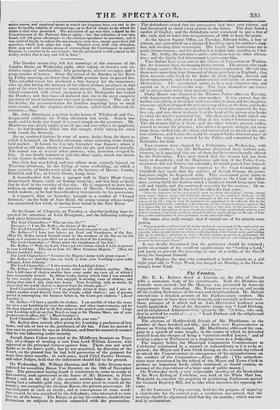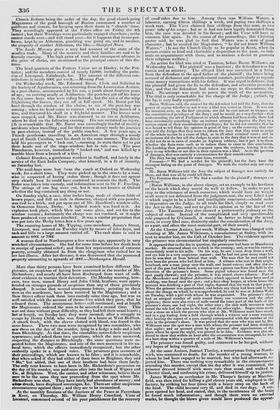br COUntrit, Mr. E. L. Bulwer dined at Lincoln on
the 31st of March with a numerous body of his constituents. Both the Members for Lincoln were invited; but Mr. Heneage was prevented by domestic engagements from attending. Mr. Tennyson was present, and nearly all the leading Reformers of the town and neighbourhood. Mr. Bulwer entered into a detailed account of his Parliamentary conduct. His speech appears to have been verfeloquent, and extremely well received : those passages of it which had an Anti-Mioisterial tendency were loudly applauded. One of the favourite toasts was " Lord Durham, and an enlightened Administration," given by Mr. ' Titchins ; who said, that he.wished he could aka, at L.j " Lord Durham and the enlightened Administration."
The electors of Huddersfield, friends of Mr. Blackburne, to the number of three hundred and fifty, met their new Representative at dinner on Friday the 4th instant. Mr. Blackburne addressed the com- pany in a speech of some length; in the course of which he defended himself from the charges of being a "pension-stuffed lawyer," and of seeking a place in Parliament as a stepping-stone to a Judgeship. The inquiry before the Municipal Corporation Commissioner at Colchester terminated in a manner as extraordinary as it is to be re- gretted; the Mayor and Town Clerk having on the seventh day refused to attend the Commissioner, in consequence of his animadversions on the conduct of the Corporation.—Essar Herald. [The animadver- sions were occasioned by the refusal of the Mayor and Town-Clerk to produce an important book, which contained, or should contain, an account of the expenditure of a large sum of public money.] On Wednesday week, a very respectable meeting of the freeholders of the West Riding of Yorkshire, was held at the White Hart Inn, Wakefield, to consider the propriety of petitioning Parliament against the General Registry Bill, and to take other measures for opposing the same.
At the Lancaster Vestry meeting, held for the purpose of imposing a church-rate for the current year, a resolution was moved, that the meeting should be adjourned Lula that day six months; which was car- ried by acclamation.
Church Reform being the order of the day, the good church-going Magistrates of the good borough of Boston summoned a number of ans and sinners, for keeping open their doors in " church" time, accordingly appeared at the Police office on Friday the 4th instant ; but their 'Worships were particularly engaged elsewhere ; so the matter stands over—and will stand over—for it happens that in one pot- frame, kept by an Alderman, gambling was going on, and in another, the property of another Alderman, the like.—Sianford News.
The Leeds Mercury gives a very bad account of the state of the woollen trade. Many of the weavcrs and their families are said to be itterally starving. The high price of' wool, and consequent advance in Um puce of cloths, are mentioned as the principal causes of this dis- tress.
The bead-quarters of the Potters Union are at Hanley, in the Pot- teries; and the members consist of nearly 12,000, including the potte- r:so of Liverpool, Edinburgh, &c. The amount of the different con- tributions is nearly 600/. per week.—Morning Post.
On Wednesday week, Mr. Edmund Bacot, Clerk and Solicitor to the Society of Apothecaries, was returning from the Launceston Assizes, is a post-chaise, accompanied by his son, a youth about fourteen years of age ; on arriving nearly at Ashburton, the post-boy got off his horse to /leg some boys who were riding behind; but the noise of the whip frightening the horses, they ran off at full speed. Mr. Bacot put his head through the window of the chaise, to see if the post-boy was conshig ; when his Lead came in contact with a projecting brunch of a tree, and fractured his skull in a frightful manner. The horses were icon stopped, and Mr. Bacot was removed to an inn at Ashburton, where he died on the following evening. his son sustained no injury. Lit is remarkable that Mr. Bacot was exceedingly fearful of meeting accidents when travelling; and for that reason always made his journies is post-chaises, instead of the public coaches. A few years ago, a }leach gentleman travelling in an American stage through a woody port of South Carolina, met his death in the same manner. The driver tail his passengers to "look out,"—meaning to warn them not to put their heads out of the stage-window, but to take care. The poor henchman, however, immediately "looked out," and was killed by a terrible blow from a branch of a tree.] Colonel Brookes, a gentleman resident in Stafford, and lately in the aervice of the East India Company, shot himself, in a fit of insanity, an Saturday last.
The mail-bags were lost from the coach at Oxford on Wednesday -week, for a short time. They were picked up in the streets by a man, who is suspected of having stolen them ; though it does not appear very dearly how he could have contrived to commit the theft. The Ender was taken into custody, and information sent to Sir F. Freeling. The strings of one bag were cut, but it was not known at Oxford whether the bag contained any thing or not.
On Sunday night, a case, nine inches long, made of sixteen folds of brown paper, and full an inch in diameter, charged with gun-powder, was tied to a brick, and put upon one of Mr. Handford's window-sills, in Osmaston Street, Derby. A lighted match was fixed in it. An explosion took place, which blew out some glass, and set fire to the window curtain ; fortunately the charge was not confined, or it might have produced very serious mischief. It was a similar preparation that was put into the Derby letter-box a few years ago.
The counting-house of Mr. Tipping, corn-merchant, James's Street, Liverpool, was entered on Tuesday night by means of false keys, and cash and bills to a large amount carried off. The cash alone is said to amount to 6001. or 7001.
A woman died in Northampton a few weeks ago, apparently in very wretched circumstances. She had for some time before her death been in receipt of parochial relief; and from her representation of extreme poverty, actually obtained 4s. from the clergyman who visited her in her last illness. After her decease, it was discovered that she possessed property amounting to upwards of 2001.—Northampton Herald.





















 Previous page
Previous page